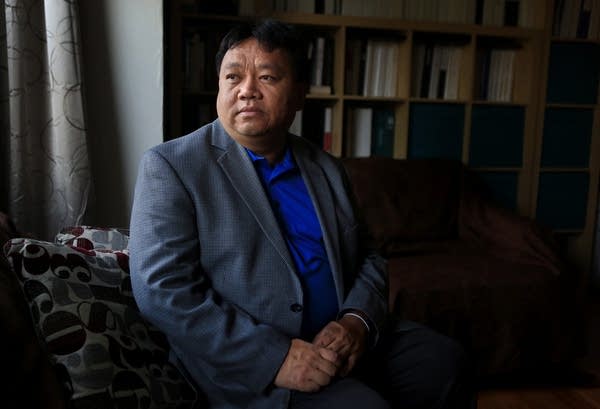From chaos to college: Scholarships honor family's journey, help Hmong students

Go Deeper.
Create an account or log in to save stories.
Like this?
Thanks for liking this story! We have added it to a list of your favorite stories.
When Chue Vang's family fled war-torn Laos four decades ago, at four he was too young to capture a lasting impression of their frantic journey.
Though his memories of his family's life in Laos are blurry, he can recall riding on his mother's back and the pulsing sound of helicopter blades above.
His family's frantic rush to safety in 1975 came at the end of the Vietnam War, when thousands of Hmong who had fought communist forces for the U.S. government fled for their lives. Vang, 44, said his father served with Hmong forces that guarded U.S. radar stations in Laos.
They found a much safer life in the United States, where Vang, and his siblings had the chance to go to school. Today, he aims to honor the opportunities found in his adopted home — and a late brother — with a new scholarship for Hmong students.
Turn Up Your Support
MPR News helps you turn down the noise and build shared understanding. Turn up your support for this public resource and keep trusted journalism accessible to all.
• More: Minnesota Sounds & Voices
Like many others, his parents, Neng Chue Vang and Mai Yia Xiong, lived through the harrowing times of war. As the fighting raged, their first four children died from disease.
"They were caught in between lines and they couldn't get them to proper health care," said Vang, born after his four older siblings died.
When he and his family escaped, they were among a group of Hmong refugees who fled their homeland on foot, by car and by boat. They hired a guide and eventually crossed the Mekong River into Thailand, where by his fifth birthday they made their way to the Nong Khai refugee camp.
It was not an especially hospitable place, recalled Vang, who now lives in Maplewood. For nearly two years, six family members, including his grandmother, lived in a single room.
"Brown and dirt and dust," is what Vang remembers of the camp. "Quite different from Laos, where it was green and flourishing and jungle like."
Then, nearly overnight, life for the Vang family changed dramatically.
In 1978, a Lutheran congregation sponsored their relocation to Omaha, Neb.
"We came at night," Vang recalled. "It was snowing. For the first time I saw snow."

A year later, his father decided to move the family to Oshkosh, Wis., where he had visited. Seeing that the Wisconsin community had very few schools, he thought it would allow rich and poor children alike to have the same academic opportunities — a contrast to Laos, where only wealthy parents could afford to send their children to school.
When Vang was seven, he and his three brothers started school, unable then to speak English.
"For the first two years it was really tough," he said. "I didn't understand a word or anything."
The family would welcome four more children and celebrate high school and college graduations.
Years later, tragedy struck again.
In 2001, Vang's 31-year-old brother Khai died after doctors at a Twin Cities hospital mistakenly diagnosed a fungal infection as pneumonia. The family settled with the hospital for an undisclosed amount.
Vang, who is generally stoic, was overcome with grief over the loss of a beloved brother who'd experienced so much with him.
"Here I am down to my knees, and every night I would just cry thinking about that, that I'd never see him again," he said.

To honor his brother, Vang decided to use some of the settlement money to create a college scholarship for Hmong students and began looking for an organization in the Hmong community to carry out his wish.
"To my surprise nobody in the community does that," he said.
College costs had risen sharply since Vang completed his bachelor's degree at the University of Wisconsin-Madison in 1995.
Back then, he said, minority and poor students interested in higher education could tap a range of public sector sources.
"So I would say Uncle Sam did a great job back then, but as you know all those money are gone," said Vang, an administrator and student adviser at Walden, an online university.
He wanted scholarships to go to Hmong students regardless of their clan lineage. After four years of research, he started the Hmong American Education Fund in 2011.
The fund is still very small — a $13,000 endowment with a $15,000 annual budget — but Vang plans to help it grow. So far, there are more than 200 contributors to the fund, which last year distributed its first eight scholarships, from $500 to $2,500.
Hmong American poverty rates, among the highest in the country, are declining. High school and college graduation rates, among the lowest in the country, are rising.
Vang is proud to have helped create a way for other Hmong American young people to go to college in a memorial to his brother.
"It's all because of this wonderful country," Vang said. "And the opportunities and the will and the freedom to dream up these good ideas, progressive and humanitarian in nature."


